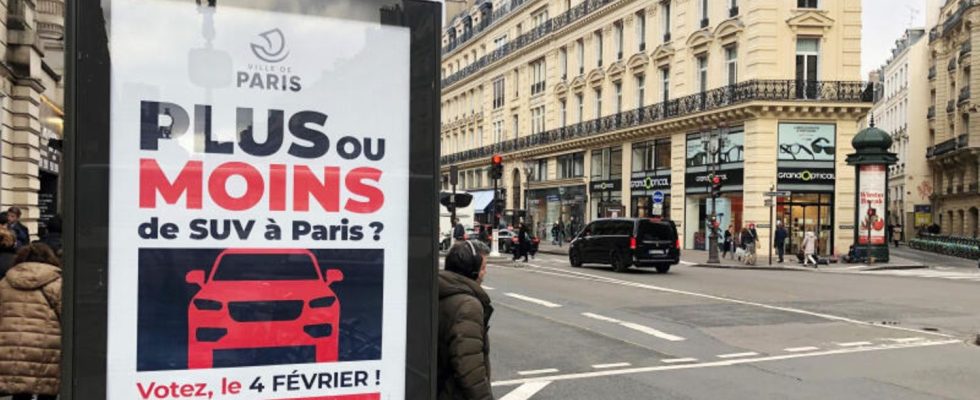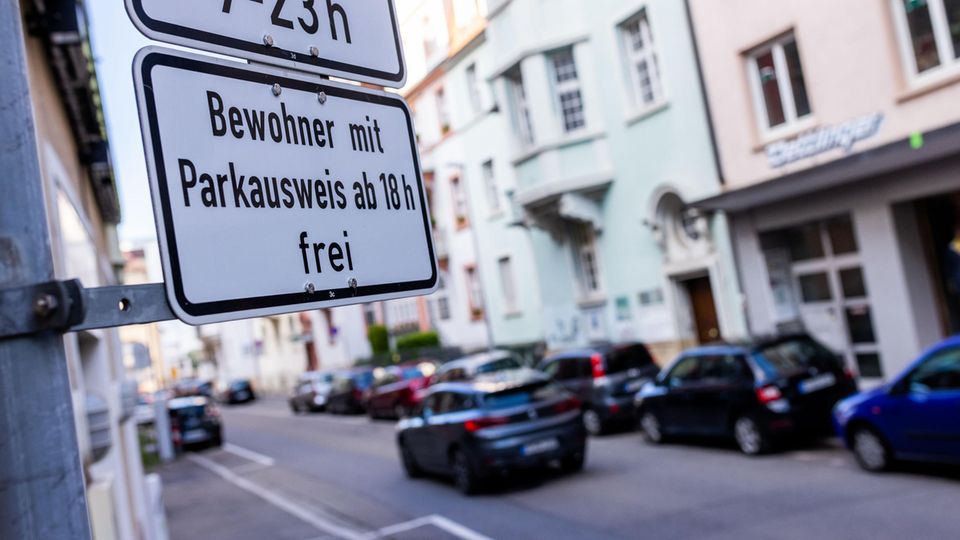analysis
SUV decision in Paris
Why parking has to become more expensive in German cities too
On billboards like this one, the city of Paris provided information about the citizen survey on increased parking fees for SUVs
© Michael Evers / dpa
Parking for SUVs is becoming more expensive. The Parisians have now decided that. Fees have also increased in Germany. Which CSU politician is responsible for this – and why the transport transition is still making slow progress.
Drivers of heavy cars will now pay 18 euros instead of 6 euros for one hour of parking in the city center of Paris, and 12 instead of 4 in the outskirts. If you want to park your SUV for six hours in the center, you have to expect to pay 225 euros instead of 75 euros. This is the result of a citizen survey.
Admittedly, it was extremely close. On Sunday, 54.5 percent voted for the fee increase, 45.5 against. This is somewhat consistent with previous surveys. What is problematic, however, is that only just under six percent of those eligible to vote took part. Such decisions require great support from the population. They are far too important not to run the risk of being turned back after a short time.
Fees and Fines
These state capitals earn the most from parked cars
Municipalities lacked any understanding of supply and demand
Pricing parking space is a key tool that cities must use to redesign public space in times of climate crisis. Germany will only achieve its climate goals if fewer people use cars in large cities. And it is already clear that many communities will have to adapt to the changing climate in order to better deal with heavy rain, heat and drought. This transformation can only be achieved with the right incentives.
In Germany, many municipalities ignored this connection for a long time, and some still do so today. There are still areas in major cities where you can park for free. And there are still local politicians who advocate for more parking spaces in city centers – and consider this to be modern transport policy.
Most municipalities in Germany have only just begun to develop clever parking space management. There was often a lack of any understanding of supply and demand. At the same time, for a long time the municipalities were not allowed to do what the most progressive among them had long wanted.
Of all people, Andreas Scheuer
You have to sort it out briefly. The SUV vote in Paris was all about visitors coming to the city. The higher parking prices are intended to ensure that more tourists switch to the metro. For a long time, the problem in German cities was much more fundamental: the federal government had stipulated that parking for residents could cost a maximum of 30.70 euros per year. This was true for almost three decades – and led to absurd subsidies for car traffic.
The city of Munich, for example, rented out a parking space at different prices. Anyone who set up a market stall paid 18 euros per day, an innkeeper for outdoor catering paid 1.50 euros – and anyone who wanted to park their car only had to pay eight cents. Resident parking was a loss-making business for municipalities, as studies show that a parking space costs at least 80 euros per year in operating costs.
After all, it was a certain Andreas Scheuer from the CSU who, as transport minister in 2020, ensured that the price cap was finally overturned. Yes, when it wasn’t about the toll, Scheuer made every effort to follow up his Sunday speeches about the future of mobility with corresponding actions. Unfortunately, not enough has happened since then.
Parking for residents is only slowly becoming more expensive
In most federal states, municipalities can now set their own fee schedule for resident parking. You can also classify prices according to different vehicle types. Exceptions are possible, for example for craftsmen and people with limited mobility. The first cities are becoming more ambitious, with fees of a few hundred euros per year. However, parking in Germany is still significantly cheaper than elsewhere in Europe.
The citizen survey in Paris could now be an important stimulus that would also revitalize the German debate. The first mayors are speaking out and are open to the idea of raising the prices for SUV parking. Environmental groups are finding new hope for their campaigns. And the pressure on the federal government is now increasing again because it is now noticeable that some federal states are not implementing the new fee exemption for municipalities.
The traffic lights could again be a nationwide regulation in the Road Traffic Act. However, its reform is currently being blocked in the Federal Council anyway. A quick agreement? Unlikely. One thing is clear: parking is no longer getting cheaper in Germany’s major cities.




